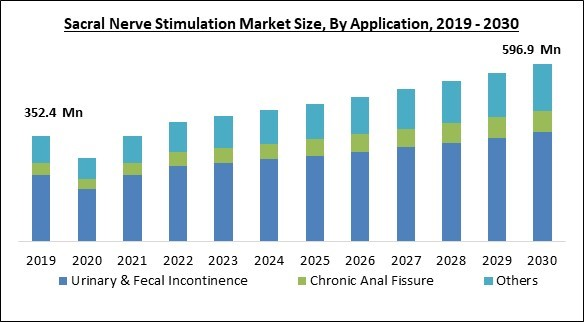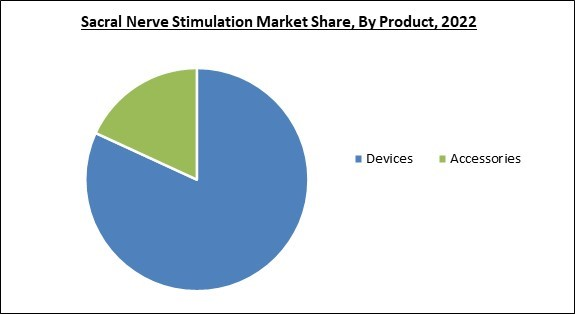The North America region is growing because of the rising treatment awareness, the incidence of OAB and urge incontinence, and the presence of reputable medical institutions. Therefore, North America region acquired $158.2 million revenue in the market in 2022. Furthermore, the market in this area is anticipated to be driven by the rapid use of technologically advanced medical products, like implantable SNS devices. The development of the local sacral nerve stimulation market is also positively impacted by rising reimbursements for technological advancements in equipment and therapeutic methods. Some of the factors impacting the market are Rising elderly population globally, rising prevalence of urological disorders, and the cost of SNS devices and procedures is generally high.
Incontinence is more common at night for most people with overactive bladder (OAB), a combination of symptoms that produce frequent and urgent urination urges. In persons 65 and older, an overactive bladder is common. OAB can develop in females at an earlier age, typically around 45. Incontinence is not only endangered by disorders or trauma. Similar to how the number of people 80 years or older is projected to treble between 2020 and 2050 to approach 426 million. As a result, the data above suggests that the aging global population would drive market growth throughout the projection period. Urological conditions are becoming more commonplace worldwide. Almost all ages can be affected by urologic illnesses and ailments, which also result in high healthcare expenses and can lead to disability, lower quality of life, and other complications. The requirement for sacral neuromodulation therapy is heightened by bladder dysfunction brought on by underlying neurological conditions such as cerebral palsy and stroke, as well as spinal trauma. As a result, it is projected that the increasing prevalence of urological illnesses will aid in market growth globally.
However, the expense of sacral nerve stimulation (SNS) devices and treatments is a substantial barrier to the market for SNS. For some individuals and healthcare systems, the costs associated with implanting & maintaining SNS devices may make them less likely to use them. The price of the treatment will increase as a result. Particularly in areas with scarce healthcare resources or financial constraints, the high cost of SNS devices and associated expenses may prevent widespread adoption and restrict market expansion.
Product Outlook
By product, the market is segmented into devices and accessories. The accessories segment acquired a substantial revenue share in the market in 2022. The need for associated accessories is rising with the widespread acceptance of SNS therapy for ailments such as fecal incontinence, chronic pelvic pain, and urine incontinence. Patients undergoing SNS treatments need certain accessories to support the operation of their implanted devices.Application Outlook
Based on application, the market is classified into urinary & fecal incontinence, chronic anal fissure, and others. In 2022, the urinary & fecal incontinence segment witnessed the largest revenue share in the market. This is because disorders including fecal impaction, interstitial cystitis, voiding dysfunction, and obstetric trauma are becoming more common. Urinary & fecal incontinence is caused by several diseases that impair bladder and bowel control. Consequently, these disorders call for a focused approach to dealing with the underlying nerve dysfunction related to them. The segment's expansion is also fueled by the market's major players' increased interest in developing stimulators with broad use.End-user Outlook
On the basis of end users, the market is categorized into hospitals, specialty clinics, and others. In 2022, the hospital segment dominated the market by generating the largest revenue share. This is due to the widespread use of sacral nerve stimulation therapy made possible by the accessibility and availability of qualified healthcare professionals, cutting-edge medical technologies and infrastructure, and solid working partnerships with insurance companies.Regional Outlook
Region-wise, the market is analyzed across North America, Europe, Asia Pacific, and LAMEA. The Asia Pacific region garnered a significant revenue share in the market in 2022. This results from the rising number of people with urine and fecal incontinence. Additionally, numerous NGOs' awareness campaigns will help increase demand. The market is also driven by multiple significant corporations in countries with economies like China and Japan.The market research report covers the analysis of key stake holders of the market. Key companies profiled in the report include Medtronic PLC, Axonics, Inc., Beijing PINS Medical Co., Ltd., PZMed, Laborie Medical Technologies, Synapse BioMedical, Inc., Johnson and Johnson, LivaNova PLC, Boston Scientific Corporation, and Saluda Medical Pty Ltd.
Scope of the Study
By Application
- Urinary & Fecal Incontinence
- Chronic Anal Fissure
- Others
By Product
- Devices
- Accessories
By End-user
- Hospitals
- Specialty Clinics
- Others
By Geography
- North America
- US
- Canada
- Mexico
- Rest of North America
- Europe
- Germany
- UK
- France
- Russia
- Spain
- Italy
- Rest of Europe
- Asia Pacific
- China
- Japan
- India
- South Korea
- Singapore
- Malaysia
- Rest of Asia Pacific
- LAMEA
- Brazil
- Argentina
- UAE
- Saudi Arabia
- South Africa
- Nigeria
- Rest of LAMEA
Key Market Players
List of Companies Profiled in the Report:
- Medtronic PLC
- Axonics, Inc.
- Beijing PINS Medical Co., Ltd.
- PZMed
- Laborie Medical Technologies
- Synapse BioMedical, Inc.
- Johnson and Johnson
- LivaNova PLC
- Boston Scientific Corporation
- Saluda Medical Pty Ltd.
Unique Offerings
- Exhaustive coverage
- The highest number of Market tables and figures
- Subscription-based model available
- Guaranteed best price
- Assured post sales research support with 10% customization free
Table of Contents
Companies Mentioned
- Medtronic PLC
- Axonics, Inc.
- Beijing PINS Medical Co., Ltd.
- PZMed
- Laborie Medical Technologies
- Synapse BioMedical, Inc.
- Johnson and Johnson
- LivaNova PLC
- Boston Scientific Corporation
- Saluda Medical Pty Ltd.










